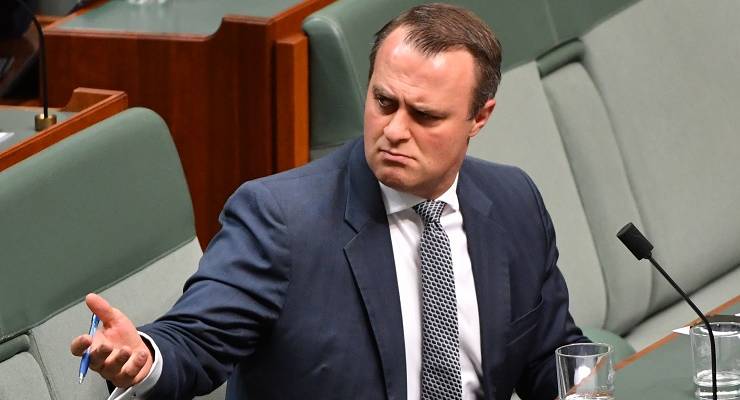
While the Liberal Party, and associated media organs continue to attack superannuation, a very real sequel to past attacks is about to play out in court.
Crikey has been waiting with bated breath for when the latest set of answers to questions about super funds asked by House of Reps economics committee chair Tim Wilson would mysteriously turn up in the offices of the Financial Review and News Corp papers.
Oddly, after we called this peculiar phenomenon out and began asking Wilson on Twitter about when we could expect anti-industry funds articles based on the answers to start showing up in the media, no such articles appeared; instead, the answers popped up where they’re supposed to be — on the committee’s website.
On closer inspection, however, we can’t take any credit for that, because it appears that super funds gave Wilson and his tame journalists little to work with.
Take for example Wilson’s question about super funds lending equity to two favourite targets of the anti-industry fund campaign, Hostplus and REST. “Since 12 March 2020, has your fund provided any liquidity to: a) REST? b) Hostplus? c) any other superannuation fund?” Wilson demanded of super funds, anxious to sniff out a suggestion that industry funds were propping up their mates. “No,” they unanimously chorused — including Hostplus and REST.
But Wilson went further. He asked Hostplus, REST and another industry fund, CBUS, “is your fund currently facing a liquidity crisis?” and if not, “is there another crisis your fund is currently experiencing?”
Let’s step back for some perspective here: this is the chair of Parliament’s economics committee suggesting — as part of an ideological campaign against industry super funds — that three industry funds may face a liquidity or some other kind of crisis.
If the market didn’t know that backbench hacks like Wilson are simply engaged in their routine attacks on the industry sector, such suggestions could have real and damaging consequences for the funds — which surely could not have been Wilson’s intention?
Hostplus noted that given there was a global pandemic, it had activated its crisis management plan “to ensure the safety of its staff and the continuity of service to its members” but otherwise there was no crisis. “Cbus is not currently facing a liquidity or any other type of crisis,” Cbus replied.
It was industry fund peak body Industry Super Australia, however, that embarrassed Wilson, who thought he had caught ISA out in the fabled Labor fundraising that Liberals have been accusing the industry sector of.
“In the 2018-19 year, according to AEC records, ISA made a contribution of $1,600 to the Labor Party. Can you provide clarification on that?” he demanded at a hearing in May. ISA was happy to.
“ISA attends the government’s budget night function and opposition budget reply function, tickets cost $800 per person and two ISA employees attended both events in 2018/19. The Labor Party has a lower reporting threshold for receipts to the AEC than the Liberal Party which explains why the AEC reported this expenditure on its website for the opposition (Labor) event but not the government (Liberal) event.”
Wilson had been caught out by his own party’s refusal to provide transparency about its political donations.
While Wilson and co are wasting the time of super funds with vexatious questions, the Australian Securities and Investments Commission — these days at least trying to do the job it conspicuously avoided doing for so many years — was preparing a major case against Colonial First State and its former owner (now part-owner), the Commonwealth Bank.
In an action filed on Monday, ASIC claims that CFS paid CBA to sell its “Essential Super” product through its branch network from 2013-18 — paid $22 million, to be exact, covering nearly 400,000 people who ended up signing up. After the Hayne royal commission exposed the arrangement, ASIC filed a civil case against both of them under the conflicted remuneration provisions of the Future of Financial Advice laws put in place by Bill Shorten when Labor was in government. That’s the FOFA laws the Liberals tried desperately to repeal when they got into government.
The Essential Super case is the perfect demonstration of what was wrong with retail super and why the FOFA laws were crucial. The Commonwealth Bank was paid by its subsidiary to flog a super product to customers allegedly regardless of their personal financial needs and regardless of the performance of the fund. And Essential Super and CSF members paid for the privilege through a flow of revenue to CSF’s owner.
There was indeed a crisis in superannuation — one the Liberals ignored until they were forced to call a royal commission that exposed such rorts.








Cracker response from ISA to Wilson – love it.
+1!
There’s no stopping him though, he’s like a relentless Robo-Ponse.
Of course anti-super campaigning also coincidentally mirrors that of the Australian Taxpayer’s Alliance which is in the same orbit, like the IPA, of the US Koch eco-system?
https://www.desmogblog.com/australian-taxpayers-alliance